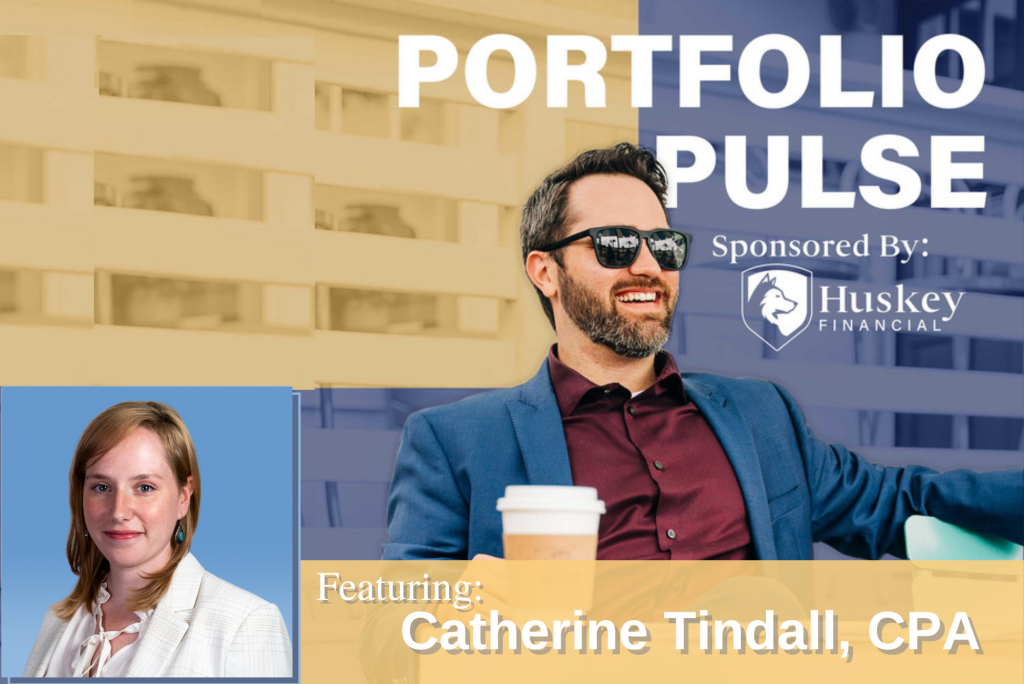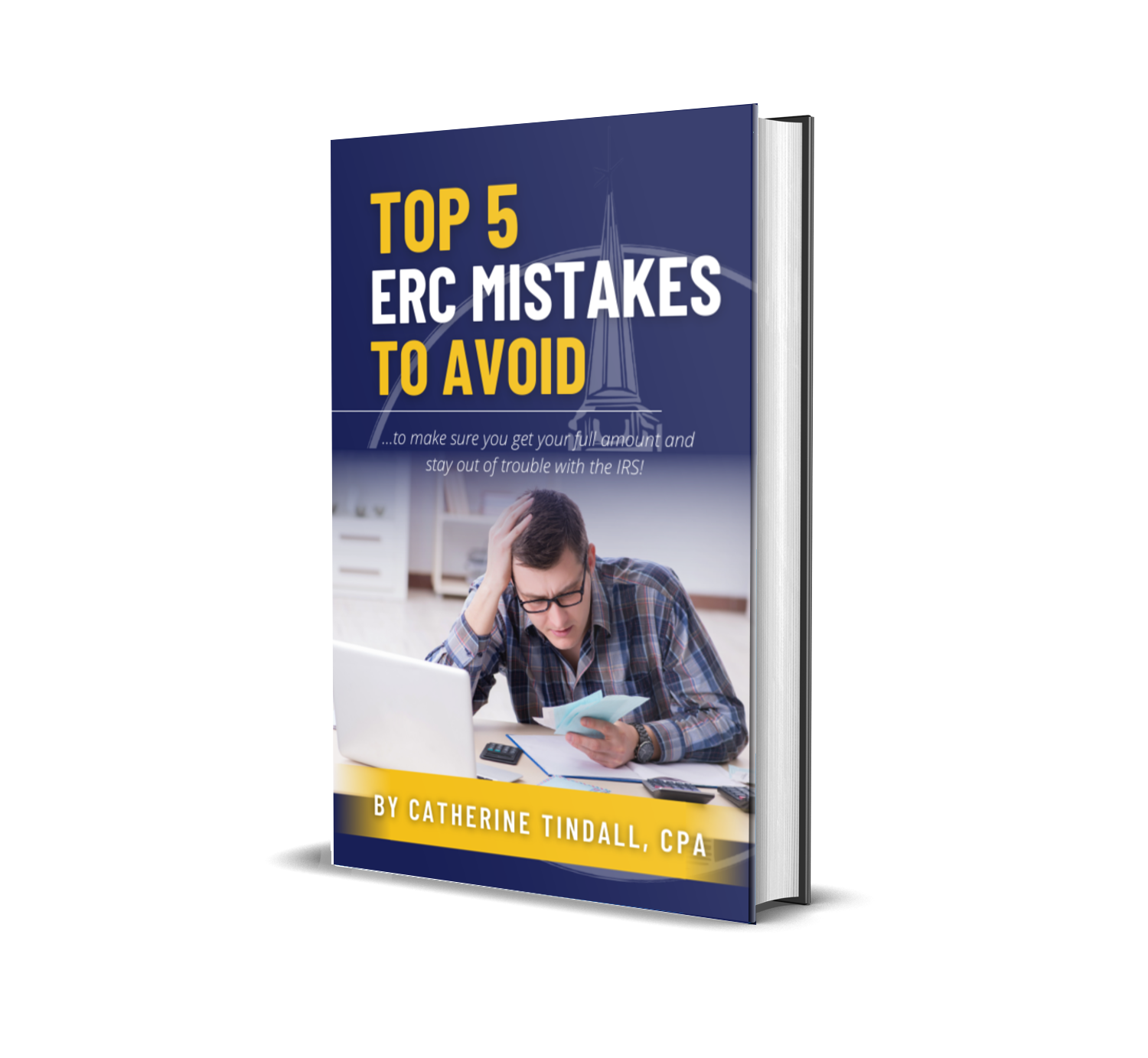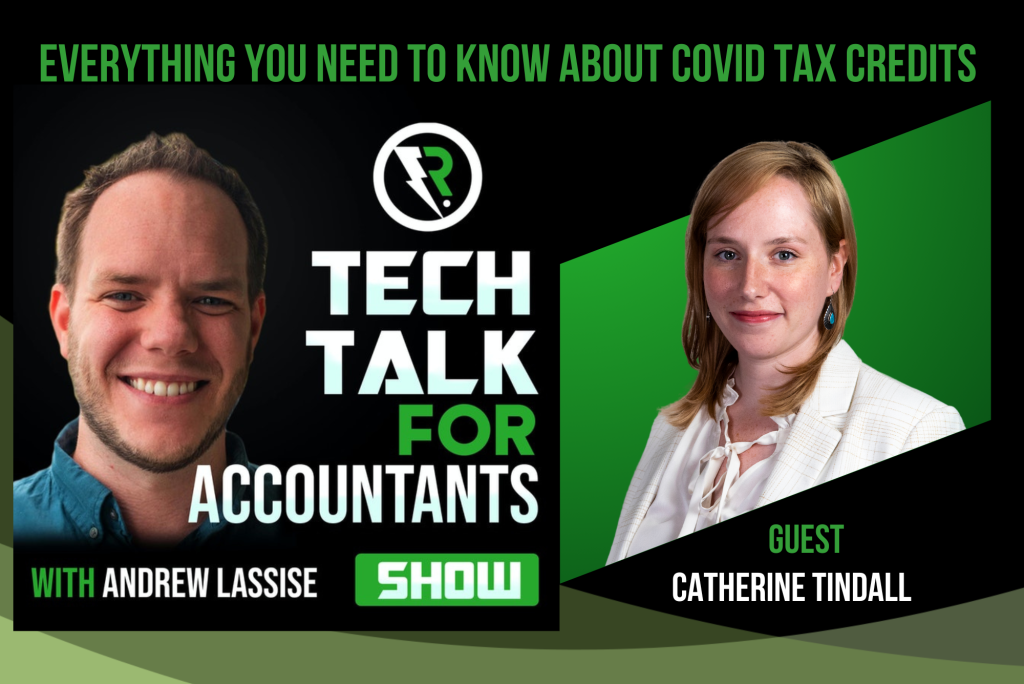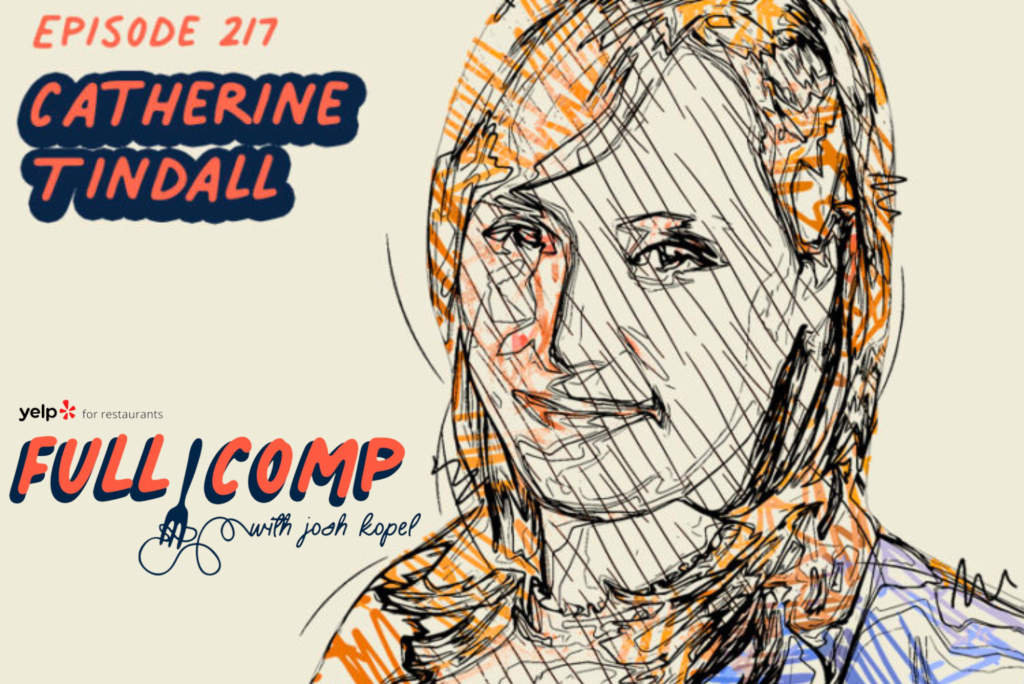
Creating an Impactful and Colossal Injection of Cash Into Your Business with Employee Retention Credits
Our guest today is renowned CPA Catherine Tindall of Dominion Enterprise Services. While she is skilled in numerous areas of tax planning, her firm has specialized in assisting business owners with the filing and determining the eligibility for the Employee Retention Credit. Eligible businesses can be rewarded with up to $26,000 in potential tax credit per employee retained during the pandemic and this payroll tax credit can create a massive one-time injection of cash for any business owner. Even if you believe you’re not eligible because of what your current tax advisor told you, or if you already received PPP money, you could still be able to receive your credit.
Catherine tells us how the process works, how beneficial this is for business owners, and why, as a planning firm, their sole focus is on helping business owners receive their credit, as it’s their right if they were impacted by the pandemic negatively. Husky Financial partners with leaders like Dominion, and we hope that you’ll reach out after hearing how your business could be impacted!
[Steven Huskey]
Welcome to Portfolio Pulse! The Money Podcasts for Medical Professionals and Entrepreneurs. I’m your host, Steven Huskey, owner of Huskey Financial Consulting and Wealth Management. Our goal is to help leaders accumulate wealth and empower them to build the life they deserve. Each week we interview a purpose driven leader or medical professional that is building a thriving business with community impact. We ask tough questions, learn the habits they practice to build successful careers and discover a secret they can pass on to help others build their businesses. It’s time to talk ,money, meanings and maximum impact.
0:35 [Steven Huskey]
Hello and welcome to Portfolio Pulse! They go to podcasts for medical professionals and entrepreneurs hoping to learn more about achieving financial wellness, accumulating wealth and building the life they deserve. In every episode we either interview a purpose driven leader or a medical professional that’s not only building a business that gives back to the community as well. When we present a subject in finance that’s relevant today. We’re not just here to talk about money, we also talk about meaning and maximum impact. I think that the guest we’ve got today is the most appropriate person to bring on that resembles our mission as a podcast and that’s Catherine Tindall, CPA and partner of Dominion Enterprise Services. Dominion Enterprises Services is a full service CPA firm providing tax planning and consulting alongside their specialty tax credit processing by combining the expertise of their daily and consulting practice with the proprietary software automations that they developed. DES is able to process tax credits like the employee retention credit both quickly and accurately. Glad to have you Catherine!
1:37 [Catherine Tindall]
Thank you so much for having me! What a great introduction.
1:40 [Steven Huskey]
You’re welcome! We always find great people to connect with on LinkedIn. That’s how you and I got together. That’s the power of networking. If you’re a business owner and you’re not doing that you gotta be all over LinkedIn. There’s some great people there.
1:52 [Catherine Tindall]
Absolutely! It’s such a great spot to find people that have thought leadership to and connect with people that kind of have the same vision for what you’re trying to achieve. It’s a great place to find camaraderie ‘cause sometimes it can get a little lonely out in the trenches, if you’re an entrepreneurially minded business owner. Engaging with people in that same headspace.
2:16 [Steven Huskey]
As big as our communities are, I could feel I was closed off at some point. So using online resources like LinkedIn or Facebook is really important for growing your COI’s or centers of influence. That’s how you and I met but I would love for our audience to know more about you Catherine, your background a little bit more about Dominion Enterprise Services.
2:34 [Catherine Tindall]
I’m a CPA. I’ve always had a tax specialty and I founded the firm a couple years ago because I really wanted to shift the focus of accounting work being something that really moved the needle for the businesses that I worked for instead of just filing forms. We really specialize in things that are close to my heart because they usually yield really high cash back to the business owners that we work with. It’s always really great for me to hear about what people are gonna do with the money that they save from taxes, from the cleaning techniques we do, especially the tax credit work that’s really popular right now that we’ve been doing for a lot of people.
3:12 [Steven Huskey]
For the business owners that don’t know much about the employee retention credit. What is it and how can they benefit from it?
3:18 [Catherine Tindall]
Yeah. So it is a COVID tax credit, it’s a one time tax credit that relates back to 2020 and 2021. So if you were operating in 2020 and 2021 and you had any kind of difficulty from the pandemic. So there’s kind of two ways you could qualify for it – if you had revenue discrepancies, quarterly revenues not consistently growing compared to 2019 or the other piece of it which this is going to be relevant for a lot of the medical people listening is if you had any kind of government mandates that restricted how you were operating. If you had things like – you had to do sanitation measures that caused you to reduce your ability to offer client appointments or patient appointments or if you had to restrict the kind of work that you could do for patients. I know certain dentists weren’t allowed to do non-emergency work in certain places for a certain amount of time. Any government orders that mess with your operations that can also qualify you for the credit. The credit itself, it’s a payroll tax credit and it comes back in the form of a check from the IRS and the dollar amounts based on your head count and the amount of quarters that you qualified for. The maximum that somebody can get is $26,000 per employee. You can imagine even with a small head count if you were impacted for most of the pandemic that can be a pretty sizable credit. What I usually recommend is if you felt like you had disruptions, because it’s such a big ticket credit if you can qualify for it, it’s worth getting a formal assessment done by a tax professional. Even for places where you had ten employees and you have restrictions for a year or two years of the pandemic it can end up being easily a 6 figure tax credit. Which is like 6 figure cash back in the mail from the IRS. It can be really impactful and it’s become a really popular thing in my practice just because our focus is trying to do things that move the needle for businesses and being able to take advantage of that one time shot in the arm of say 150,000 or $250,000 is cash that you can do what you want with it, that makes a huge change for a lot of people.
5:24 [Steven Huskey]
I agree and in all my business plans that I’ve done for physicians, dental practices in medical practices as well. One of the biggest pain points that they mentioned to me is cash flow. And this advice injection of cash or something that they weren’t even expecting. I’ve also heard people say that if they had PPP money coming that they thought that they weren’t eligible for the ERC. Can you clarify on that?
5:48 [Catherine Tindall]
Originally, when they started the program that was the case. If you got PPP money, you wouldn’t be eligible for the ERC. Congress quickly realized that was not a good way to set that up so they revised it. A lot of people got bad guidance. That’s subsequently been changed, they do interact with each other so if you’ve got PPP it will reduce your employee retention credit but I’ve not had a single case come across my desk where it reduced it so much that there wasn’t any ERC or it wasn’t worth pursuing. If you did get PPP, especially if you got the second round, you’re most likely going to be eligible for some employee retention credit as well.
6:37 [Steven Huskey]
Fantastic! I was going through your website and I know you had at one point sent me a couple case studies of some successes that’s based on received work with you having received quite a bit of money back in ERC. Can you give us an example of a really good case study that you enjoy working with?
6:53 [Catherine Tindall]
Well I had one recently that was a really nice claim. It’s a company in Kentucky and they do hearing aid supplies and hearing aid assessments and appointments. Basically they had social distancing requirements from their state that caused them to only be able to see 2/3 of the amount of patients that they have capacity for most of the pandemic. They only didn’t have a huge headcount, maybe 10 to 15 employees but they were able to qualify for almost all the pandemic and they ended up qualifying for like $250,000. Which was great and as a proportion of what their revenue was, it’s a pretty big dollar figure! That was a really nice case and a really good win. They initially didn’t think that they were going to be eligible but when we dug into what the government orders were and the rules of the credit they passed with flying colors. It was a great win for them and that’s the purpose of the credit. It’s really reimbursing people for the hardship that went through during the pandemic in a way that’s going to be significant. Also a big thing that was pushing the economy is keeping people employed and most of those business owners are gonna just push that money right back into growing their business. That’s what the government is trying to achieve with this program. It’s just great! It was really exciting to work with them and talk through what they’re going to do with the funds. I just really enjoyed that because it’s just gonna make a huge difference for the business.
8:30 [Steven Huskey]
I agree! And reinvesting in the business will help them scale it. It’ll help them keep people employed and there’s a ripple effect on the concept. not just you and your family that benefits from this business. It’s the employees that work with you every day. It’s their clientele that you help each and every day and then it’s also their families, ? All these people benefit from this business, the ripple effect there is very strong. This cash influx can really really help the business.
8:57 [Catherine Tindall]
Unlike with the PPP program where you had a limited use of those funds, you had to use it for payroll. The nice thing with the ERC is you can use that money for whatever you want because it’s a refund of the payroll and payroll taxes that you had already paid. I’ve seen a lot of people where they missed out on contributing to retirement during the pandemic because they were just trying to keep things going and so they were able to catch up using these funds. That’s what a lot of people have done with it as well as OK well I couldn’t contribute to my 401K the past two years so I’m gonna push some of this money into buying some new equipment, hiring that assistant that I’ve always known that I’ve needed for like two years and then I’m going to push the rest into funding my retirement that I missed out on. It’s really nice ‘cause you can do what you want with it and kind of reap the benefits of where you think it needs to go in a way that you’re not really restricted which I think a lot of people really like.
9:52 [Steven Huskey]
Awesome! I think what sets our planning firm apart is the fact that we lead with cash flow. We want people to understand that they do have more money on their balance sheet than they thought they did. They can reinvest in their business. They can put money towards retirement. They can take care of those employees that help grow the company and get them excited about the growth and the trajectory of that company by giving them deferred compensation plans. You can do a number of things at this point. So we know that there needs to be some sense of urgency around getting these questions about ERC these business owners might have answered. So when is the deadline for getting this done? And how can you, Catherine and your firm help?
10:26 [Catherine Tindall]
Basically the credits are going to start phasing out in April of next year. We’re already in under a year before the credit starts to begin to phase out and the tough thing with it is once it phases out, it’s the timeline that’s the phase out not a funds cap. Unlike with the PPP where there’s only so much money, that’s not how this program works. It’s a tax credit, it’s like a refund, it’s baked into the tax code and as long as you apply before the time limit times out you’re legally entitled to the money. But IRS processing times are pretty slow. For smaller claims, they’re saying it’s about five months. For larger claims it could be up to 12 months. You really want to try to get assessed and everything processed as soon as you can. Just because of that timing gap with the IRS as well. If you wait six months to do it and then it’s still going to be another 12 months from the IRS that’s a pretty long wait time for that amount of money. When we work with clients it only takes maybe two hours of their time in order to just collect the documents that we need and answer any questions that they have through a couple phone calls. So for two hours of your time there’s very few activities I can have as a business owner that can yield six figures.I would say to get started, we just do an initial assessment. It’s complementary, just to see if your company is eligible and roughly how much you’d be eligible for. We want there to be no risk or no penalty for trying to see if you’re eligible and in the worst case scenario you’re not eligible but you’ve at least gotten a second opinion and made sure that was the case.
12:08 [Steven Huskey]
I love the fact that you’re focusing on this one thing and really helping all these businesses across the country. Find this extra money.
[Promotional]
12:44 [Steven Huskey]
So tell me about your practice and once this ERC thing has dwindled off. What are some of the things that are able to help these business owners with? What are your real passions in the CPA world?
12:55 [Catherine Tindall]
The nice thing too with us is we do these for other CPA firms and we’ve really enjoyed having that niche specialty to be able to work with other firms. My partner has a practice area of research and development tax credits so we’re gonna pivot to doing the same thing with the research and development credit that we’ve done with the ERC. Basically because we’ve built a lot of technology automations to be able to calculate the credit and just have really high quality products that is going to maintain the right documentation for the IRS and all that sort of thing.We’re thinking of doing the same thing for research and development credits ‘cause it’s another area where a lot of people are eligible for, but there’s not really good systems in place to track it for a lot of these smaller businesses who could be eligible for it. It’s not quite as lucrative for the clients as the employee retention credit is because there are more hoops that you have to jump through with the IRS but it’s another one of those places where a good amount of automation and having that kind of CPA quality control touch on it. I think it would be a good place to pivot into and really does move the needle for businesses to innovate and grow which is what we really enjoy doing.
14:11 [Steven Huskey]
Amazing! So for these people who have interest in the ERC, finding out more about it and you tell them a three year synopsis that like hey he’s gonna be on a 12 month timeline possibly is there anyway you can help these business owners give money sooner?
14:23 [Catherine Tindall]
Yeah! We have a couple of different relationships with people who are able to offer financing. It’s not something that we quarterback directly but we can definitely make those introductions and a lot of the time, I tell people if there’s very few things in life that are as certain as the government paying out on its debts and so you’re entitled to the money. P Part of what we do, talk through with people is getting a sense of what would you be doing with it? Because that gives us the ability to also explain things like the income tax effects and just the best way to negotiate from a broader business perspective of what you should consider doing with the funds. W We do have a couple different relationships that we can make introductions to. OK, if you’re going to be getting $250,000 and five months from now or six months seven or eight months from now, what would you be able to do if you had that money now? And is it worth pursuing something like financing so that you could use those funds now, let’s say seven or 8% interest rate Where you’re basically on par with inflation, what could you really do if you didn’t have that weight? That’s part of the conversation we have and some of those relationships were able to open up the door for people who can work with us.
15:43 [Steven Huskey]
Got it. So we’ve had a brief conversation in the past about helping businesses sell your business on your terms. What kind of work do you do in the exit planning field?
15:54 [Catherine Tindall]
Well, currently we’re not working too much in that space but in the future we’re intending to do more of helping clients with the planning related to exit strategies. People wait until the last minute to deal with it and if that you’re going to be selling your business in five years or six years, the time to start doing the tax planning is now because a lot of the statutes around how you can reduce your capital gains tax or things that you need a good amount of runway to get the legal structures in place and operate under those new legal structures for a certain amount of time to get the benefits. That’s one of those things like with anything in taxes, it’s a penny of prevention is worth a pound of cure. It’s very true when it comes to tax. The more you can be proactive and work with the practitioner who’s gonna be proactive and catch things before the transactions happen well before they happen so that you can do proper planning that it can make millions of dollars of tax difference.
17:06 [Steven Huskey]
Absolutely! A lot of what we do with our clients is exit planning. We help them sell for the amount they want to the desired recipient of the business. Working 3-5 years at minimum prior to the sale of the business can have a major implication of how much you actually take home. Being proactive about that, I can’t stress it enough that it needs to be done.
17:35 [Catherine Tindall]
And its years of proactivity. It’s not, “Hey! We’re going to sell the business next year.” That’s too late. As soon as that’s the end goal in place you should start planning around it. Because it can take a while to orchestrate.
17:49 [Steven Huskey]
And you can have this business for 2-3 years and be ready to sell it in 10 years and start something new. That’s a great opportunity to reach out to me. We’ll work with Catherine on making sure you get the bang for your buck. Then if you’re interested in looking in the ERC credit and seeing you’re eligible for this, also reach out to me or directly to Catherine. We’ll make sure to do what we can to assist you with that injection of cash that you’re entitled to.
18:20 [Catherine Tindall]
Definitely! And I say the one other piece that I commonly encounter with people is – “My existing CPA said that I wasn’t eligible” and I usually say, for $250,000 are you just gonna pass that off? If you’re working with a smaller practitioner, they don’t handle a lot of these cases and understand how the nuances of them work. You could be stuck in the gray zone where they just didn’t want to do the work and that’s why they told you you weren’t eligible without really actually digging into the case. The other side of it too that I see a lot of people miss out on is they think their accountant already checked it out or they think their payroll company checked it out and they just don’t. They fall through the cracks. So If you’re not sure, it’s worth just at least having somebody take a second look. Get a second pair of eyes on it because it is such a big ticket amount of money. Then after a year once it’s gone, it’s gone. It’s not like you can go back and get it a year from now when it starts to phase out. So it’s one of those things you wanna take the time and really fully vet it out.
19:31 [Steven Huskey]
I’m liking it to – you wouldn’t want your mechanic making you a four course meal in a five star restaurant. You want someone who’s a practitioner in that space. A specialist who really understands it and makes sure that the second set of eyes is worth its weight in gold.
19:48 [Catherine Tindall]
Yeah and and I’ve had people come across my desk with an existing practitioner and I talked to the existing practitioner and assess the difficulty of the claim. We talk shop, work with them or for the most part what ends up happening, usually the CPA starts sending us more business because for them to try to master a one time tax credit that’s like over 200 pages of legislation that’s a big request for them. That’s why we’ve made it a niche. We actually got featured by Intuit recently for it. Niche was working with other CPA firms because for a lot of the companies that really should be taking advantage of this, their practitioners just don’t have the capacity to be able to do the work. That’s what we’ve made a space in and have found a lot of grateful other CPA’s that we work with. Because their clients weren’t going to get this otherwise.
20:47 [Steven Huskey]
So if you’re a CPA, if you’re a small business owner, if you’re just interested in seeing if maybe your employer is eligible for this and you bring that up to your head hunch, you’re gonna be the gold boy. So how can they get in touch with you Catherine, about this ERC credit?
21:00 [Catherine Tindall]
I’d say the best way to get in touch with us is visit our website dominiones.com. There’s an eligibility tool in there where you can just answer a couple questions. It’ll let you roughly look like you’re eligible for the ERC. If you want us to reach out to do a full assessment to see how much you could actually be getting, we’re happy to just do that as a complimentary exercise to let you know what your credit would be and then what it would be like to work together if you want to pursue it.
21:27 [Steven Huskey]
Awesome! Well I’ll make sure to put your website and eligibility tool in the liner notes of this episode. So any listeners can go on there and click to check out that direct connection with Catherine. Pleasure having you on! I really appreciate all the great information you shared today.
21:40 [Catherine Tindall]
Yeah. Thank you for having me. I always hope that these messages get out to people who maybe hadn’t encountered the tax credit before and if they can start to pursue this with their own professional or with a specialty firm like ours. I’m always happy to try to move the needle for people in a way that I think is big impact and especially with this credit. It can be really substantial so anybody who can take advantage of it I’m really grateful.
22:04 [Steven Huskey]
I agree. Is there any question that I didn’t ask you today that you wish I did?
22:08 [Catherine Tindall]
Not anything that I can think of.
22:11 [Steven Huskey]
Perfect! Well, thank you so much again for your time and again if anybody that’s interested in what we do. Please let us know. We’ll be happy to assess your situation.
22:19 [Catherine Tindall]
Thank you!
22:20 [Steven Huskey]
Thanks for joining us today on Portfolio Pulse. If you found this helpful and think others deserve to hear about us as well. Please like, subscribe and share us across any platform on social media for your podcast platform of choice. That’s it for today! Remember to be happy, stay healthy and tune in next time to remain financially fit.
This podcast is for informational purposes only and is not to be construed as tax legal or investment advice although the information has been gathered from sources believed to be reliable. Please note that individual situations can vary therefore the information should be relied upon only when coordinated with individual professional advice. Guest speakers and their firms are not affiliated with or endorsed by Guardian or by Huskey Financial Group LLC and opinions stated are their own. Guardian and its subsidiaries, agents and employees do not provide tax legal or accounting advice. Consult your tax legal or accounting professional regarding your individual situation.
Maybe You Like
FAQs About The California Employee Retention Credit
ERC For Restaurants: 5 Things Restaurant Owners Should Know
COVID Tax Credits – Catherine Tindall, CPA

Don’t be the next victim of ERC mistakes!!
If you want to learn more about the credit and the process for claiming it, be sure to check out our short e-book that goes through the top five mistakes we see time and time again in the restaurant and other industries when it comes to the ERC





